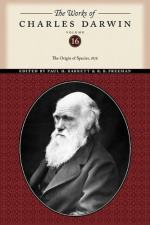
|
| Name: _________________________ | Period: ___________________ |
This quiz consists of 5 multiple choice and 5 short answer questions through Chapter 8: Hybridism.
Multiple Choice Questions
1. What is the fate of traits that are neither helpful nor unhelpful for survival?
(a) They are not subject to natural selection.
(b) The are bred out of the species.
(c) They are subject to natural selection.
(d) They are subject to artificial selection.
2. Which term refers to a type of variation that is seen in most or all groups of organisms?
(a) Definite variation.
(b) Organism variation.
(c) Species variation.
(d) Indefinite variation.
3. Why are some useless organs sill found in animals?
(a) They were used by ancestors.
(b) Selection takes time.
(c) They have not been bred out.
(d) All organs have a purpose.
4. In Chapter 4: Natural Selection, what does Darwin suggest about most variations?
(a) They lead to species regeneration.
(b) They are not helpful for survival.
(c) They are helpful for survival.
(d) They are caused by domestication.
5. What may hinder positive traits from being passed on during natural selection?
(a) Interbreeding.
(b) Normal breeding.
(c) Crossbreeding.
(d) Single organism breeding.
Short Answer Questions
1. What type of species are most likely to inter-breed?
2. What happens when species are inter-bred?
3. What do naturalists say about the situation of hybrids resembling their parents?
4. What does Darwin state is a main difference between first generation mongrels and first generation hybrids?
5. As an example of a variation, what does Darwin indicate in Chapter 1 that is a change due to improved diet?
|
This section contains 277 words (approx. 1 page at 300 words per page) |

|




